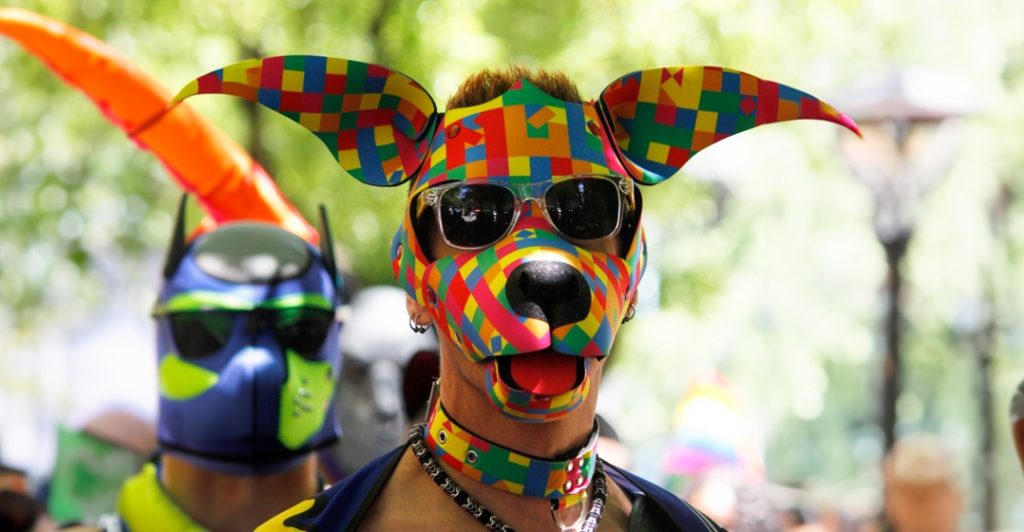In the vast landscape of evolving kinks, one gaining traction is pup play—a unique form of role play predominantly within LGBTQ+ communities. Similar to the friendly world of furries, where individuals wear furry animal costumes, pup play enthusiasts immerse themselves in a playful mindset inspired by puppy behavior.
Exploring Pup Play: Beyond Fursuits and Fantasy
Pup play is a form of role play that goes beyond the conventions of the BDSM community. Participants, known as “pups” or “handlers,” mentally, physically, and emotionally take on roles resembling playful puppies or responsible guides called “handlers.” Contrary to common misconceptions, pup play isn’t solely focused on sexual pleasure; it’s about embracing a different facet of one’s identity.
Pups and handlers wear distinctive pup play gear, featuring essential items like a pup mask, a collar, knee pads, and a leash. Handlers engage with their pups through playful interactions, involving pup toys, belly rubs, commands, and attention. In return, the pups express their enthusiasm by barking, playfully crawling on their knees and hands, and welcoming further affection from the handlers.
While pup play has been around for a while, it’s still gaining popularity, and those who immerse themselves in it create their unique “pup persona.” This creative exploration allows individuals to step out of their daily routines and embrace a more playful side.
Community and Connection
The pup play community is characterized by openness and friendliness. Individuals connect through community apps, Facebook, and regular events called “moshes,” often held in LGBTQ+ venues. The overarching theme among roleplaying kinks is the desire to escape the monotony of daily life, rekindling the playful spirit many experienced in childhood.
One of Ryan’s pups told us: “I was a very playful and positive kid, but as I grew older, adulthood brought responsibilities like paying bills, pretending to laugh at my bosses’ jokes, and being exposed to sad and depressing news from around the world. However, when I put on my pup gear, I can forget all that for a moment.”
A survey highlighted that pup play is predominantly popular among queer men. This could be attributed to societal expectations that cast men as more dominant figures, perpetuating the pressure to conform to notions of professionalism and maturity. These expectations might prompt individuals to seek relaxation and take a break, and engaging in role-playing can fulfill that need.
So, why is it so popular amongst LGBTQ+ communities, you might ask? Ryan told us that the reason could be that the LGBTQ+ community is known for giving its members the space and freedom and being open-minded. “With so many different kink groups in our community, we seem to be less judgy about how people behave or dress.”
The LGBTQ+ community, known for its inclusive and open-minded nature, provides a welcoming space for those seeking unconventional forms of expression. However, the appeal of pup play isn’t confined to any particular group. Ryan, the owner of PuppyPlayExpert.com, notes a rising interest from women and straight couples, including CEOs, lawyers, and doctors. For them, the puppy play mask becomes a transformative tool, allowing them to shed the stresses of their professional lives and embrace a carefree, playful existence, even if it’s only for a moment.
Pup Play: More Than a Kink, a Community
Although a significant portion of the community views their roleplaying as having a sexual aspect, Ryan underscores that it goes beyond “only” sexual activities. He emphasizes the significance of community and the pure enjoyment of having fun. Whether stepping into the “pup headspace” or releasing real-life worries, the essence of pup play is found in the shared experience. It serves as a testament to the diverse and accepting nature of LGBTQ+ communities, offering individuals a space to explore, connect, and discover freedom in the art of pup play.
If you’re intrigued by pup play, Ryan emphasizes that the community is exceptionally welcoming to beginners. On his website, he provides a guide on how to ease into the world of pup play. Yet, it’s understandable that some may cast curious or perplexed glances when encountering those engaged in pup play activities. Despite potential judgment, a valuable lesson from the pup play community extends beyond personal participation. Even if pup play isn’t your cup of tea, the community teaches us the importance of occasionally stepping back, reconnecting with the simple joy of “enjoying and having fun.” In the midst of our often stressful daily lives, it’s crucial to refocus on ourselves and our natural desire to let loose and enjoy life.
